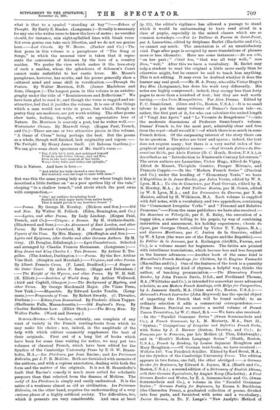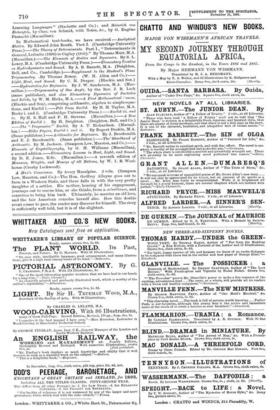ScnooL-Booas.—No teacher, certainly, can complain of any want of variety
in the French reading-books from which he may make his choice ; nor, indeed, in the amplitude of the help with which editors commonly supplement the text of their originals. First out of a long list of books which have been for some time waiting for notice, we may put two volumes of classical French, which have been edited for the Syndics of the Cambridge University Press by E. G. W. Braun- holtz, M.A.,—Les Plaideurs, par Jean Racine; and Les PrOcieuses Ridicules, par J. P. B. Moliere. Both are furnished with memoirs of the authors, and with a copious annotation, dealing with both the form and the matter of the originals. It is not M. Braunholtz's fault that Racine's comedy is much more suited for scholastic purposes than that selected from the dramas of Moliere. The motif of Les Plaideurs is simply and easily understood. It is the satire of a weakness almost as old as civilisation. Les Prdcieuses Ridicules, on the other hand, requires the understanding of a very curious phase of a highly artificial society. The difficulties, too, which it presents are very considerable. And once at least (p. 11), the editor's vigilance has allowed a passage to stand which it would be embarrassing to have read aloud in a class of pupils, especially in the mixed classes which are so common nowadays.—For Le Tailleur de Pierres de Saint-Point, par A. Lamartine, edited by Stephan Barlet (Hachette and Co.), we cannot say much. The annotation is of an unsatisfactory kind. Page after page is occupied by mere translations of phrases more or less idiomatic. Here are some instances :—De son cold, " on her part ; " c'eitait bon, " that was all very well " mon Dieu, " well." After this we have a vocabulary. M. Barlet may help a student to read the original a little more easily than he otherwise might, but he cannot be said to teach him anything. This is not editing. It may even be doubted whether it does the learner any real good.—Mr. H. A. Perry, who edits Victor Hugo's Buy Bias (Longmans), has done his work very differently. His notes are highly compressed ; indeed, they occupy less than forty pages to more than a hundred of text ; but they are well worth having.—Les Trois Mousquitaires. Par Alex. Dumas. Edited by F. C. Sumichrast. (Ginn and Co., Boston, U.S.A.)—It is no small labour to put the many volumes of Dumas's famous tale—or, rather, the first part of it, for who can calculate the united length of " Vingt Ans Apres " and " Le Vicomte de Bragelonne "?—into the moderate dimensions of Professor Sumiehrast's volume. Dumas' French is, for the most part, admirably clear and free from the argot—shall we call it P—of which there is so much in some French fiction. Of the surpassing interest of the story there can be no question. The notes are brief and sparse ; indeed, the text does not require many ; but there is a very useful index of bio- graphical and geographical names.—Sept Grands Auteurs du Dia- neuxienie Siecle, par Alice Fortier (D. C. Heath, Boston, U.S A.), is described as an "Introduction to Nineteenth Century Literature." The seven authors are Lamartine, Victor Hugo, Alfred de Vigny, Alfred de Musset, Theophile Gautier, Prosper Merimee, and Francois Coppee.—In the "Modern French Series" (Percival and Co.) under the heading of "Elementary Texts," we have L'Expedition de in Jeune-Hardee, par Jules Verne, edited by W. S. Lyon, M.A. ; Un Cas de Conscience, par Paul Gervais, edited by K. B. Horsley, M.A. ; Le Petit Tailleur Bouton, par M. Genin, edited by W. S. Lyon, M.A. ; and Les Prisonniers du Caucase, par X. de Maistre, edited by H. Wilkinson, M.A. Each volume is supplied with full notes, with a vocabulary, and two appendices, containing the " Commonest Irregular Verbs " and " Personal and Relative Pronouns."—From the same publishers we have also received :- Six Semaines en Velocipede, par S. E. Baley, the execution of a happy idea, a master telling to his pupils, by way of combining instruction and amusement, his holiday experiences ; Chants du Cycne, par Georges Ohnet, edited by Victor T. T. Spiers, M.A. ; and Guerres Maritimes, par C. Jurien de la Graviere, edited by W. S Lyon (the wars are of the Empire and the Republic).— Le Earlier Se la Jeunesse, par A. Esclangon (Griffith, Farran, and Co.), is a volume meant for beginners. The fables are printed with interlinear translations, which become less and less frequent as the learner advances.—Another book of the same kind is Macmillan's French Readings for Children, by G. Eugene Fasnacht (Macmillan and Co.) One of the features of the book is a quantity of the very simplest kind of rhymes, a helpful way, thinks the author, of teaching pronunciation.—The Elementary French Reader, by John Francis Davis, D.Lit., and Ferdinand Thomas, B.A. (Whittaker and Co.), is intended for somewhat more advanced scholars, as are Modern French Readings, with Helps for Composition, by A. Jameson Smith, M.A. (Ginn and Co., Boston, U.S.A.)— Deleconib's French Instructor (John Heywood) has the special object of imparting the French that will be found useful ; to an ordinary selection it adds a commercial correspondence.— From Messrs. Percival we receive a useful volume of French Unseen Translation, by W. C. Steel, B.A.—We have also received : —In the "Parallel Grammar Series" (Swan Sonnenschein and Co.), A French Grammar, by L. M. Moriarty, M.A., Part II., " Syntax ; " Conjugations of Irregular and Defective French Verbs, with Notes by J. J. Brower (Sutton, Drowley, and Co.) ; Le Francais par le Francais, par Leo Melliet (J. Thin, Edinburgh) ; and in " Heath's Modern Language Series " (Heath, Boston, U.S.A.), French by Reading. by Louise Seymour Houghton and Mary Houghton.—Of German text-books, we have received :- Wilhelm Tell. Von Friedrich Schiller. Edited by Karl Breul, MA., for the Syndics of the Cambridge University Press. The edition appears in two forms, one full, the other abridged.--A German Reader for Beginners, by Edward S. Joynes, M.A. (Heath and Co., Boston, U.S.A.) ; a second edition of a Dictionary of English Idioms, with their German Equivalents, by August Koop (Hachette) ; A First German Reader and Writer, by E. A. Sonnenschein and Co. (Swan Sonnenschein and Co.), a volume in the " Parallel Grammar Series ; " German Poetry for Beginners, by Emma S. Buchheim (the Clarendon Press), a graduated collection of poems, divided into four parts, and furnished with notes and a vocabulary ;
Junior Berman,' in Dr. F. Lange's "New Analytic Method of
Learning Languages" (Hachette and Co.) ; and Heinrich von Eichenfels, by Chro. von Schmid, with Notes, &c., by G. Eugene Fasnacht (Macmillan).



















































 Previous page
Previous page